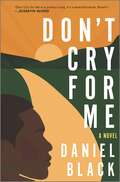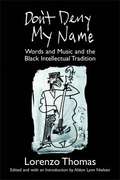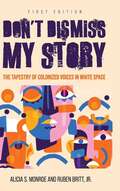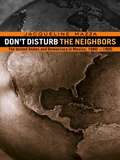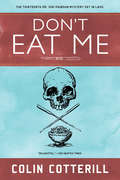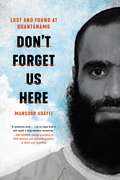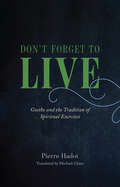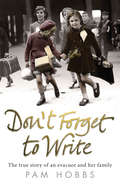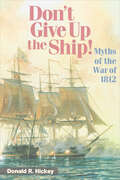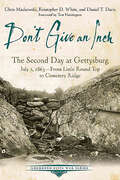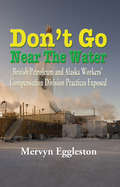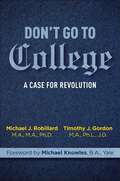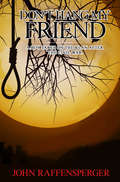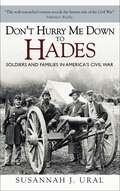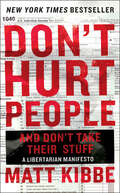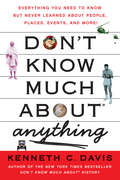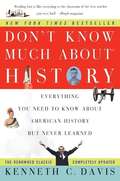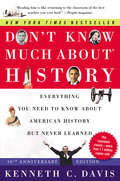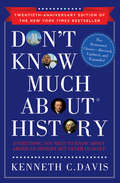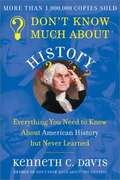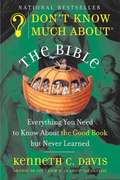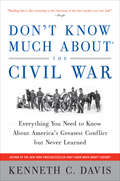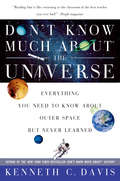- Table View
- List View
Don't Cry for Me: A Novel
by Daniel BlackNAMED A MOST ANTICIPATED BOOK IN ESSENCE MAGAZINE, THE MILLIONS AND BOOKISH"Don't Cry for Me is a perfect song."—Jesmyn WardA Black father makes amends with his gay son through letters written on his deathbed in this wise and penetrating novel of empathy and forgiveness, for fans of Ta-Nehisi Coates, Robert Jones Jr. and Alice WalkerAs Jacob lies dying, he begins to write a letter to his only son, Isaac. They have not met or spoken in many years, and there are things that Isaac must know. Stories about his ancestral legacy in rural Arkansas that extend back to slavery. Secrets from Jacob's tumultuous relationship with Isaac's mother and the shame he carries from the dissolution of their family. Tragedies that informed Jacob's role as a father and his reaction to Isaac's being gay.But most of all, Jacob must share with Isaac the unspoken truths that reside in his heart. He must give voice to the trauma that Isaac has inherited. And he must create a space for the two to find peace. With piercing insight and profound empathy, acclaimed author Daniel Black illuminates the lived experiences of Black fathers and queer sons, offering an authentic and ultimately hopeful portrait of reckoning and reconciliation. Spare as it is sweeping, poetic as it is compulsively readable, Don't Cry for Me is a monumental novel about one family grappling with love's hard edges and the unexpected places where hope and healing take flight.
Don't Deny My Name: Words and Music and the Black Intellectual Tradition
by Lorenzo Thomas Aldon Lynn NielsenBeginning by laying out the case that the blues is a body of literature that captured the experience of African American migrants to the urban North and newer territories to the West, the essays provide a tour of the movement through classic jazz, bop, and the explosions of the free jazz era, a section on R&B and soul and also a meditation on rap music that attempts to bring together the extremes of emotion that hip hop elicits, and the collection ends with an unfinished preface to the volume.
Don't Dismiss My Story: The Tapestry of Colonized Voices in White Space
by Ruben Britt Alicia S MonroeDon't Dismiss My Story: The Tapestry of Colonized Voices in White Space provides readers with a historical account of white-centered power dynamics and dominance in elementary, secondary, and higher education and the legacy of failure and hopelessness experienced by non-white students, faculty, and administrators. The book deeply examines the constructs of white privilege and entitlement and provides readers with a transformative framework to create authentic, inclusive learning spaces where multi-hyphenated identities are welcomed, seen, and heard. <p><p>The opening chapter offers a historical perspective of the origin of colonialism and its impact on education in the United States. Readers learn how the founding principles of education in the U.S. are based on the colonial school's model of the British education system, which is the bedrock for exclusion, elitism, and the preservation of white privilege and Eurocentric culture. Following chapters address the psychological and social effects of exclusive education and encourage readers to examine their own personal biases and privilege through self-reflection. The closing chapter offers a transformative framework to stimulate the cultivation of authentic and inclusive learning environments through intergroup relational and collaborative practices that focus on diversity, equity, inclusion and belonging in educational spaces. Each chapter features an introduction, reflection exercises, key takeaways, and a case study that spotlights a real-world experience to deepen and enrich learning for all readers. <p><p>Don't Dismiss My Story is an essential resource for current and prospective educators and education professionals who are committed to co-creating learning spaces that "call out" inequities and "call in" hope and equitable access for all students at all levels of education.
Don't Disturb the Neighbors: The US and Democracy in Mexico, 1980-1995
by Jacqueline MazzaFirst published in 2001. Routledge is an imprint of Taylor & Francis, an informa company.
Don't Eat Me (A Dr. Siri Paiboun Mystery #13)
by Colin CotterillBetween getting into a tangle with a corrupt local judge, and discovering a disturbing black-market business, Dr. Siri and his friend Inspector Phosy have their hands full in the thirteenth installment of Colin Cotterill's quirky, critically acclaimed series.Dr. Siri Paiboun, the 75-year-old ex-national coroner of Laos, may have more experience dissecting bodies than making art, but now that he’s managed to smuggle a fancy movie camera into the country, he devises a plan to shoot a Lao adaptation of War and Peace with his friend Civilai. The only problem? The Ministry of Culture must approve the script before they can get rolling. That, and they can’t figure out how to turn on the camera.Meanwhile, the skeleton of a woman has appeared under the Anusawari Arch in the middle of the night. Siri puts his directorial debut on hold and assists his friend Phosy, the newly promoted Senior Police Inspector, with the ensuing investigation. Though the death of the unknown woman seems to be recent, the flesh on her corpse has been picked off in places as if something—or someone—has been gnawing on the bones. The plot Siri and his friends uncover involves much more than a single set of skeletal remains.
Don't Forget Us Here: Lost and Found at Guantanamo
by Mansoor AdayfiThis moving, eye-opening memoir of an innocent man detained at Guantánamo Bay for fifteen years tells a story of humanity in the unlikeliest of places and an unprecedented look at life at Guantánamo.At the age of 18, Mansoor Adayfi left his home in Yemen for a cultural mission to Afghanistan. He never returned. Kidnapped by warlords and then sold to the US after 9/11, he was disappeared to Guantánamo Bay, where he spent the next 15 years as Detainee #441.Don't Forget Us Here tells two coming-of-age stories in parallel: a makeshift island outpost becoming the world's most notorious prison and an innocent young man emerging from its darkness. Arriving as a stubborn teenager, Mansoor survived the camp's infamous interrogation program and became a feared and hardened resistance fighter leading prison riots and hunger strikes. With time though, he grew into the man prisoners nicknamed "Smiley Troublemaker": a student, writer, and historian. With unexpected warmth and empathy, he unwinds a narrative of fighting for hope and survival in unimaginable circumstances, illuminating the limitlessness of the human spirit. And through his own story, Mansoor also tells Guantánamo's story, offering an unprecedented window into one of the most secretive places on earth and the people—detainees and guards alike—who lived there with him. Twenty years later, Guantánamo remains open, and at a moment of due reckoning, Mansoor Adayfi helps us understand what actually happened there—both the horror and the beauty—a vital chronicle of an experience we cannot afford to forget.
Don't Forget to Live: Goethe and the Tradition of Spiritual Exercises (The France Chicago Collection)
by Pierre HadotThe esteemed French philosopher Pierre Hadot’s final work, now available in English. With a foreword by Arnold I. Davidson and Daniele Lorenzini. In his final book, renowned philosopher Pierre Hadot explores Goethe’s relationship with ancient spiritual exercises—transformative acts of intellect, imagination, or will. Goethe sought both an intense experience of the present moment as well as a kind of cosmic consciousness, both of which are rooted in ancient philosophical practices. These practices shaped Goethe’s audacious contrast to the traditional maxim memento mori (Don’t forget that you will die) with the aim of transforming our ordinary consciousness. Ultimately, Hadot reveals how Goethe cultivated a deep love for life that brings to the forefront a new maxim: Don’t forget to live.
Don't Forget to Write: The true story of an evacuee and her family
by Pam Hobbs'Dad walked determinedly down the path, joined by two neighbours with five children between them. As we reached the corner of Kent Avenue, I looked back for one last wave. But Mum had buried her head in her pinny and it was a year before I saw her again.'In June 1940, 10-year-old Pam Hobbs and her sister Iris took the long journey from their council home in Leigh-on-Sea to faraway rural Derbyshire.Living away from Mum and Dad for two long years, Pam was moved between four foster homes. In some she and Iris found a second family, with babies to look after, car rides and picnics, and even a pet pig. But other billets took a more sinister turn, as the adults found it easy to exploit the children in their care.Returning to Essex, things would never be the same again, and the war was far from over. Making do with rations, dodging bombs and helping with the war effort, Pam and her family struggled to get by.In Don't Forget to Write, with warmth and vivid detail, Pam describes a time that was full of overwhelming hardship and devastation; yet also of kindness and humour, resilience and courage.
Don't Give Up the Ship!: Myths of the War of 1812
by Donald R. HickeyNo longer willing to accept naval blockades, the impressment of American seamen, and seizures of American ships and cargos, the United States declared war on Great Britain. The aim was to frighten Britain into concessions and, if that failed, to bring the war to a swift conclusion with a quick strike at Canada. But the British refused to cave in to American demands, the Canadian campaign ended in disaster, and the U.S. government had to flee Washington, D.C., when it was invaded and burned by a British army. By all objective measures, the War of 1812 was a debacle for the young republic, and yet it was celebrated as a great military triumph. The American people believed they had won the war and expelled the invader. Oliver H. Perry became a military hero, Francis Scott Key composed what became the national anthem and commenced a national reverence for the flag, and the U.S.S. Constitution, "Old Ironsides," became a symbol of American invincibility. Every aspect of the war, from its causes to its conclusion, was refashioned to heighten the successes, obscure the mistakes, and blur embarrassing distinctions, long before there were mass media or public relations officers in the Pentagon. In this entertaining and meticulously researched book by America's leading authority on the War of 1812, Donald R. Hickey dispels the many misconcep-tions that distort our view of America's second war with Great Britain. Embracing military, naval, political, economic, and diplomatic analyses, Hickey looks carefully at how the war was fought between 1812 and 1815, and how it was remembered thereafter. Was the original declaration of war a bluff? What were the real roles of Canadian traitor Joseph Willcocks, Mohawk leader John Norton, pirate Jean Laffite, and American naval hero Lucy Baker? Who killed the Shawnee chief Tecumseh and who shot the British general Isaac Brock? Who actually won the war, and what is its lasting legacy? Hickey peels away fantasies and embellishments to explore why cer-tain myths gained currency and how they contributed to the way that the United States and Canada view themselves and each other.
Don't Give an Inch: The Second Day at Gettysburg, July 2, 1863—From Little Round Top to Cemetery Ridge (Emerging Civil War Series)
by Chris Mackowski Kristopher D. White Daniel T. DavisThis vividly detailed Civil War history reveals many of the incredible true stories behind the legendary sites of the Gettysburg battlefield.Having unexpectedly been thrust into command of the Army of the Potomac only three days earlier, General George Gordon Meade was caught by a much harsher surprise when the Confederate Army of North Virginia launched a bold invasion northward. Outside the small college town of Gettysburg, the lead elements of Meade’s army were suddenly under attack. By nightfall, they were forced to take a lodgment on high ground south of town. There, they fortified—and waited. “Don’t give an inch, boys!” one Federal commander told his men.The next day, July 2, 1863, would be one of the Civil War’s bloodiest. With names that have become legendary—Little Round Top, Devil’s Den, the Peach Orchard, the Wheatfield, Culp’s Hill—the second day at Gettysburg encompasses some of the best-known engagements of the Civil War. Yet those same stories have also become shrouded in mythology and misunderstanding. In Don’t Give an Inch, Emerging Civil War historians Chris Mackowski and Daniel T. Davis peel back the layers to share the real and often-overlooked stories of that fateful summer day.
Don't Go Near The Water: British Petroleum and Alaska Workers' Compensation Division Practices Exposed
by Merv EgglestonAt British Petroleum's power plant on the oil-field at Prudhoe Bay, Alaska, a worker experienced nearly a decade of health issues. Repair of a contamination source in the drinking water system, with its sudden resolution of some of the symptoms, both revealed the problem and presented an unexpected situation. Management reacted and a man 55 years old lost his job and career as the situation was buried. Actions of some professionals and the state's people simply seemed to be one-sidedly, goal oriented--and all a disaster for the victim. Medical input concerned cancer and there has been, as feared, an exceptional amount of cancer among the plant's crew-members. Several of them have already died. This book is an effort to tell the story in an attempt to get the remaining crew members monitored for their protection. Be prepared to encounter some unexpected and possibly troubling things.
Don't Go to College: A Case for Revolution
by Timothy Gordon Michael RobillardAn examination of how America's colleges have become an intellectual hell on Earth for anyone who wishes to think rationally and seek truth and wisdom, as well as a plan for how young citizens can claim and safeguard the learning and heritage to which they are entitled.From safe-spaces and trigger warnings, to grievance studies and neo-Marxist indoctrination, to sexual degeneracy and hook-up culture, to student loan indentured servitude, to useless degrees with no translatable real-world application, the modern-day American university now functions as the complete inversion of its original purpose. Rather than creating civically-minded, competent citizens and adults able to provide for themselves, their families, and their society, America&’s universities now function as institutional assembly lines for the production of the new 21st century global citizen-serf: atomized, infantilized, dependent, and pacified. This book provides the definitive diagnosis of what exactly happened to America&’s universities while giving the reader a blueprint for how young citizens, parents, and local communities alike can safeguard, escape, and begin resisting such pernicious indoctrination and illogical woke nonsense.
Don't Hang My Friend: A Boy Takes on the Klan After the Civil War
by John RaffenspergerYoung teenage boy living in southern Illinois during the post-Civil War era encounters Ku Klux Klan hostility. Klan threatens to hang his friend a former slave for an involvement in the killing of a rabid dog owned by Klan member. Young man rouses townspeople to intervene. Young man also encounters girl for whom he develops feelings and together his rise to protect his friend gives him foresight into his future.which demands a redirection of the path he was going to take. Girl also returns feeling but does not show them until the end when young man goes off to meet his future.
Don't Hurry Me Down to Hades: The Civil War in the Words of Those Who Lived It
by Susannah UralDon’t Hurry Me Down to Hades is the story of families enduring the whirlwind of the Civil War, told through the words of famous and ordinary citizens and ranging from the battlefield to the home front, from presidential councils to frontier revivals. The book reveals how Americans on both sides of the Mason and Dixon line withstood four years of brutal, unrelenting conflict. Of the hundreds of thousands of books published on the American Civil War, this is one of the few to approach the nation’s defining conflict from this powerful perspective. Grounded in rare family letters and diaries, Don’t Hurry Me Down to Hades captures Americans’ wide-ranging reactions to the war and their astonishing perseverance. Some of the accounts are entirely unknown to readers, while better-known events are told from unusual perspectives. Abraham Lincoln’s assassination, for example, is shared from the viewpoint of Major Henry Rathbone and his fiancée (and stepsister) Clara Harris, while Lewis Powell’s attempt on Secretary of State William Seward’s life is seen through the terrified eyes Fanny Seward, who was seated next to her father when Powell burst into the room. Madison and Lizzie Bowler help readers understand how the war brought a Minnesota couple together in marriage and then nearly drove them apart when Madison insisted that his first duty was to his nation while Lizzie believed it was to her and their newborn daughter. A thousand miles to the south, two Texas families also suffered through their soldiers’ absence and tried to explain to their young children why father had “gone to war” with “Santaclause.” And to the north in Kentucky, a runaway slave won freedom for himself and his family by joining the Union Army only to face prejudice as brutal and destructive as the life he’d left behind. Readers are carried alongside these families, sharing their dreams that the fighting might end this year and suffering with them when the Reaper comes calling. Through these and other stories, Don’t Hurry Me Down to Hades invites readers to set aside previous assumptions to learn about the divisions and range of opinions on both sides from ordinary and famous men and women, black and white, slave and free. Esteemed Civil War historian Susannah J. Ural brings fresh insight into the war by delving into historical archives and private family papers to peal back the passage of time. Her consummate narrative weaves together a textured, powerful portrait of a nation at war with itself.
Don't Hurt People and Don't Take Their Stuff: A Libertarian Manifesto
by Matt KibbeDo you believe in the freedom of individuals to determine their own future and solve problems cooperatively?Don't hurt people, and don't take their stuff. Simple and straightforward, that's liberty in a nutshell—no assembly required.And yet it seems like, more and more, the decisions Washington makes about what to do for us, or to us, or even against us, are having an increasingly adverse impact on our lives. Young people can't find jobs, millions of Americans are losing the health care plans they were promised they could keep, and every one of us is somehow being targeted, monitored, snooped on, conscripted, induced, taxed, subsidized, regulated, or otherwise manipulated by someone else's agenda, based on someone else's decisions made in some secret meeting or closed-door legislative deal.What gives?Our government is out of control. But setting things right again requires that you step up and take your freedom back.From Matt Kibbe, the influential leader of FreedomWorks, Don't Hurt People and Don't Take Their Stuff is the first true manifesto of a new libertarian grassroots movement. As political powermongers and crony corporatists in Washington continue to consolidate their control and infringe on our most fundamental liberties, Kibbe makes the libertarian case for freer people, more voluntary cooperation, and solving problems from the bottom up. He calls out the tyranny of faceless bureaucrats with too much power and discretion, laying out a clear road map for restoring liberty. A witty yet piercing critique of government's expanding control over you and your future, Don't Hurt People and Don't Take Their Stuff is a vital read for all those who cherish personal liberty and the unalienable right to choose your own path in life.
Don't Know Much About American History
by Matt FaulknerAn author's name goes on the cover of a book. But behind that are a great many people who make it all happen.
Don't Know Much About Anything
by Kenneth C. DavisIn his wildly entertaining, winningly irreverent, New York Times bestselling Don't Know Much About® series, author Kenneth C. Davis has amused and edified us with fascinating facts about history, mythology, the Bible, the universe, geography, and the Civil War. Now, the sky's the limit in his latest irresistible installment--a grand tour of knowledge that carries us from the Great Smoky Mountains to the Berlin Wall, from the Salem Witch Trials to Watergate, from Michelangelo to Houdini. Brimming with busted myths, gripping true stories, and peculiar particulars about a plethora of people, places, and events, this captivating compendium is guaranteed to delight information lovers everywhere as it feeds our insatiable appetite to know everything!
Don't Know Much About Anything
by Kenneth C. DavisIn his wildly entertaining, winningly irreverent, New York Times bestselling Don't Know Much About® series, author Kenneth C. Davis has amused and edified us with fascinating facts about history, mythology, the Bible, the universe, geography, and the Civil War.Now, the sky's the limit in his latest irresistible installment--a grand tour of knowledge that carries us from the Great Smoky Mountains to the Berlin Wall, from the Salem Witch Trials to Watergate, from Michelangelo to Houdini. Brimming with busted myths, gripping true stories, and peculiar particulars about a plethora of people, places, and events, this captivating compendium is guaranteed to delight information lovers everywhere as it feeds our insatiable appetite to know everything!
Don't Know Much About History
by Kenneth C. DavisWho really discovered America? What was "the shot heard 'round the world"? Thomas Jefferson and Sally Hemings: Did he or didn't he? From the arrival of Columbus through the bizarre election of 2000 and beyond, Davis carries readers on a rollicking ride through more than 500 years of American history. In this updated edition of the classic anti-textbook, he debunks, recounts, and serves up the real story behind the myths and fallacies of American history.
Don't Know Much About History [30th Anniversary Edition]: Everything You Need to Know About American History but Never Learned
by Kenneth C DavisA New York Times bestseller · More than 1.7 Million Copies Sold!“Reading Davis is like returning to the classroom of the best teacher you ever had!” —People magazineFrom the arrival of Columbus through the historic election of Barack Obama and beyond, Kenneth C. Davis carries readers on a rollicking ride through more than five hundred years of American history. In this 30th anniversary edition of the classic anti-textbook—which includes a new preface by Davis—he debunks, recounts, and serves up the real story behind the myths and fallacies of American history.
Don't Know Much About History, Anniversary Edition
by Kenneth C. DavisHere, celebrating the twentieth anniversary of its debut as a New York Times bestseller, is the revised, updated, and expanded edition of the classic anti-textbook that changed the way we look at history. First published two decades ago, when the "closing of the American mind" was in the headlines, Don't Know Much About® History proved Americans don't hate history-just the dull version that was dished out in school. With wit and irreverence, in question-and-answer form, Don't Know Much About® History took readers on a rollicking ride through more than five hundred years of American history, from Columbus's voyages to recent events. The book became an instant classic and has sold more than 1.6 million copies. Now Davis has brought his groundbreaking work up to the present, including the history of an "Era of Broken Trust," from the end of the Clinton administration through the recent Great Recession. This additional material covers the horrific events of 9/11 and the rise of conspiracy theorists, the wars in Iraq and Afghanistan, Hurricane Katrina and the failure of the New Orleans levees, the global financial meltdown, the election of Barack Obama, and the national controversy of same-sex marriage. For history buffs and history-phobes alike, for longtime fans who need a refresher course, and for a new generation of Americans who are still in the dark about America's past, Davis shows once more why People magazine said, "Reading him is like returning to the classroom of the best teacher you ever had."
Don't Know Much About History: Everything You Need to Know About American History But Never Learned
by Kenneth C. DavisThe author describes the rollicking ride through more than 500 years of American history. In this updated edition of the classic anti-textbook, he debunks, recounts, and serves up the real story behind the myths and fallacies of American history.
Don't Know Much About the Bible: Everything You Need to Know About the Good Book but Never Learned
by Kenneth C. DavisDavis presents the Bible book by book describing succinctly the actions and backgrounders.
Don't Know Much About the Civil War: Everything You Need to Know About America's Greatest Conflict but Never Learned (Don't Know Much About Series)
by Kenneth C. DavisWhy did Abraham Lincoln sneak into Washington for his inauguration? Was the Gettysburg Address written on the back of an envelope?Where did the Underground Railroad run? Can you answer these questions? If not, you're not alone! New York Times-bestselling author Kenneth C. Davis comes to the rescue, deftly sorting out the players, the politics, the key events -- Emancipation and Reconstruction, Shiloh and Gettysburg, Generals Grant and Lee, Harriet Beecher Stowe -- and providing little-known facts that will enthrall even learned Civil War buffs. Vivid, informative, and hugely entertaining, Don't Know Much About® the Civil War is the only book you'll ever need on "the war that never ended."
Don't Know Much About the Universe
by Kenneth C. DavisWho dug those canals on Mars? What was the biblical Star of Bethlehem? Were the pyramids built by extraterrestrials?From the ancients who charted the heavens to Star Trek, The X-Files, and Apollo 13, outer space has intrigued people through the ages. Yet most of us look up at the night sky and feel totally in the dark when it comes to the basic facts about the universe.Kenneth C. Davis steps into that void with a lively and readable guide to the discoveries, theories, and real people who have shed light on the mysteries and wonders of the cosmos. Discover why Einstein was such a genius, the truth behind a blue moon or two, the amazing secrets of Stonehenge, and even how one great astronomer lost his nose.With the fun question-and-answer format that has appealed to the millions of readers of his bestselling Don't Much About® series, you'll be taking off on an exciting armchair exploration of the solar system, the Milky Way, and beyond.
